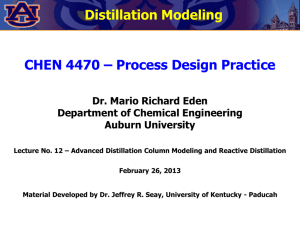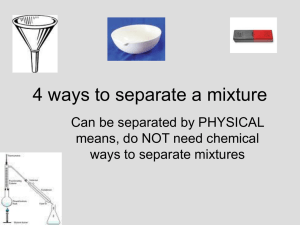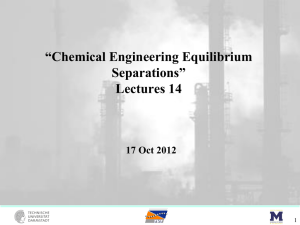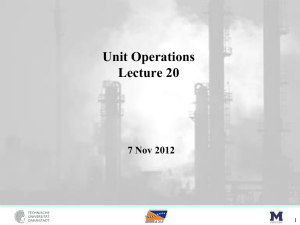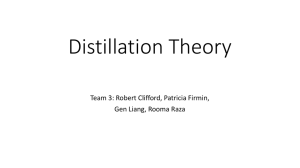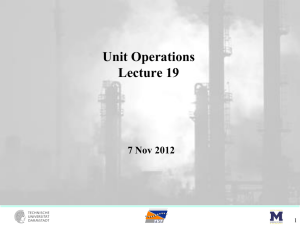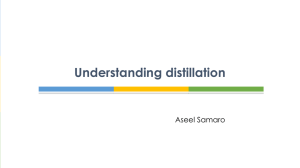Lectures 15
advertisement
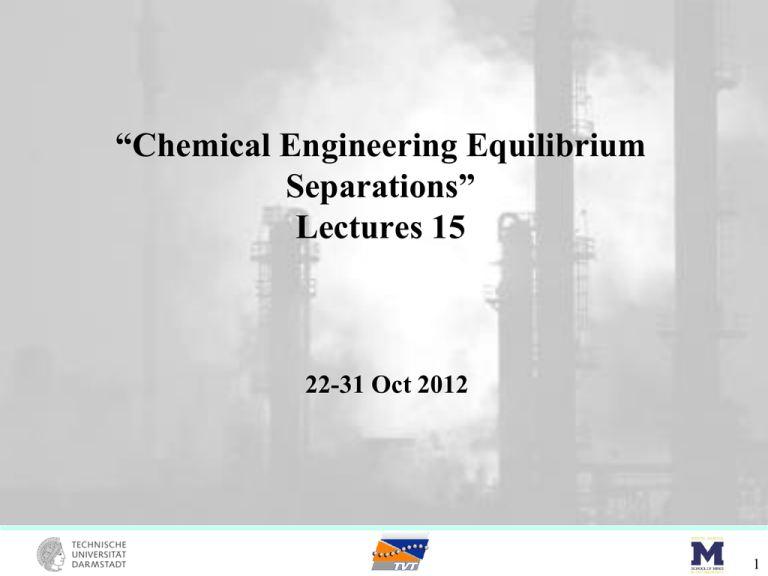
“Chemical Engineering Equilibrium Separations” Lectures 15 22-31 Oct 2012 1 In-Class Problem benzene (17 mol%) toluene (66 mol%) m-xylene (17 mol%) D S HO RT Y DSTWU FEE D F = 100 kmol/s sat’d liquid 1 atm B 1.0135 bar Component Benzene Toluene m-Xylene Tbp oC 80.1 110.7 139.1 Pi star [bar] 80.1 oC 123 oC 1.0135 3.217 0.387 1.42 0.151 0.645 2 In-Class Problem 3 In-Class Problem 4 In-Class Problem 5 In-Class Problem 6 In-Class Problem 7 In-Class Problem 8 Overview •AspenPlus: o Shortcut methods: DSTWU o Rigorous method: RADFRAC • Efficiencies • Introduction to multicomponent distillation (Chapter 9) 9 Homework Problem benzene (17 mol%) toluene (66 mol%) m-xylene (17 mol%) Xbz = 99 mol% D S HO RT Y DSTWU FEE D F = 100 kmol/s sat’d liquid 1 atm B Xbz = 0.1 mol% 1.0135 bar Component Benzene Toluene m-Xylene Tbp oC 80.1 110.7 139.1 Pi star [bar] 80.1 oC 123 oC 1.0135 3.217 0.387 1.42 0.151 0.645 10 HWK Problem-molefrac specified 11 HWK Problem-molefrac specified 12 Overview •Review rigorous methods / RADFRAC • Multicomponent systems: o Residue curves o DSTWU / RADFRAC o Rules of thumb • Complex (Enhanced) distillation • Column internals • Batch distillation 13 Multicomponent Rigorous Methods Rigorous Methods: solution of stage by stage material balances, energy balances, and thermodynamic equilibrium equations. 14 AspenPlus: RADFRAC Rigorous two- or three-phase fractionation for single columns. Models absorbers, strippers, reactive distillation, and so forth. • RadFrac is a rigorous model for simulating all types of multistage vapor liquid fractionation operations. In addition to ordinary distillation, it can simulate: o absorption, reboiled absorption, stripping, reboiled stripping, extractive and azeotropic distillation 15 Rigorous Model 16 AspenPlus: RADFRAC Rigorous two- or three-phase fractionation for single columns. Models absorbers, strippers, reactive distillation, and so forth. • RadFrac is a rigorous model for simulating all types of multistage vapor liquid fractionation operations. In addition to ordinary distillation, it can simulate: o absorption, reboiled absorption, stripping, reboiled stripping, extractive and azeotropic distillation • RadFrac is suitable for: o three phase systems, narrow boiling and wide boiling systems, systems exhibiting strong liquid phase nonideality • RadFrac can detect and handle a free water phase or other second liquid phase anywhere in the column. You can decant free water from the condenser. • RadFrac can handle solids on every stage. • RadFrac can model columns where chemical reactions are occurring. Reactions can have fixed conversions, or they can be: o equilibrium, rate controlled, electrolytic • RadFrac can model columns where two liquid phases exist and different chemical reactions occur in the two liquid phases. RadFrac can also model salt precipitation. • RadFrac can operate in rating mode or design mode. • With Aspen Rate-Based Distillation feature, RadFrac can perform rate-based distillation calculations (packed tower configurations). 17 Rating Mode 18 19 20 Design Mode 21 Rigorous Model 22 Multicomponent Methods AspenPlus (methanol, ethanol, 1-propanol): Component MeOH EtOH 1-Propanol P*i (64.5 oC) 1.013 bar 0.5709 0.2534 Keys AspenPlus Txy 23 “Residue” From Batch Distillation Seader & Henley (2006) 24 Residue Curve Map 25 Residue Curve Map 26 Residue Curve Map 27 DSTWU Zi = 1/3 MeOH recovery (dist.) = 99.9% R = 1.2 * Rmin EtOH recovery (dist.) = 0.1% 28 RADFRAC Zi = 1/3 F = 100 kmol/h R = 5.2 N = 63 NF = 31 D = 33 kmol/h 29 Residue Curve Map 30 Plot Wizard 31 NF = 21 32 Set up Scheme 2 (1st column only) • Run DSTWU • Run RADFRAC • Check performance 33 Questions? 34
